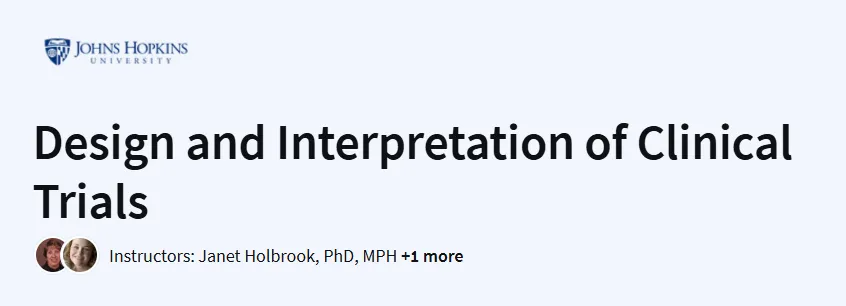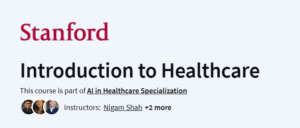What you will learn in Design and Interpretation of Clinical Trials Course
- This course offers a comprehensive introduction to the design and interpretation of clinical trials, emphasizing the scientific, ethical, and regulatory aspects.
- Learners will gain insights into various trial designs, including randomized controlled trials, and understand methods to control bias and confounding variables.
- The program covers the principles of randomization, masking, and the selection of appropriate outcome measures.
Students will explore the ethical considerations in clinical research, focusing on informed consent and participant safety.
The course delves into statistical methods for analyzing trial data and interpreting results.
Real-world case studies provide practical experience in evaluating the validity and applicability of clinical trial findings.
Program Overview
Bias Control: Randomization and Masking
⏱️4-5 weeks
- Understand the importance of controlling bias in clinical trials.
- Learn about different randomization techniques and their applications.
- Explore masking (blinding) methods to prevent bias in treatment allocation and outcome assessment.
Outcomes in Clinical Trials
⏱️4-5 weeks
- Identify and define primary and secondary outcome measures.
- Learn about composite and surrogate outcomes and their roles in trials.
- Understand the impact of outcome selection on the interpretation of trial results.
Ethical Issues in Clinical Trials: Informed Consent
⏱️4-5 weeks
- Explore the ethical principles governing clinical research.
- Understand the components and process of obtaining informed consent.
- Learn about the roles and responsibilities of Institutional Review Boards (IRBs).
Recruitment and Retention
⏱️4-5 weeks
- Develop strategies for effective participant recruitment and retention.
- Understand the challenges and solutions related to participant adherence.
- Learn about the importance of diversity and representation in clinical trials.
Get certificate
Job Outlook
- The demand for clinical research professionals is growing, with increasing numbers of clinical trials globally.
- Clinical trial expertise is valuable in pharmaceutical companies, academic research institutions, and regulatory agencies.
- Entry-level positions such as Clinical Research Coordinator offer salaries ranging from $50K to $70K annually, with potential for growth into roles like Clinical Trial Manager or Regulatory Affairs Specialist.
- Skills in trial design, ethical considerations, and data interpretation are highly sought after in the field.
- This course enhances job prospects for roles involved in clinical trial design, monitoring, and analysis.
- Certification from a reputable institution like Johns Hopkins University adds credibility and recognition in the industry.
- The growing focus on evidence-based medicine increases the need for professionals skilled in interpreting clinical trial data.
- Knowledge gained from this course can serve as a foundation for advanced studies in clinical research and related fields.
Specification: Design and Interpretation of Clinical Trials Course
|
FAQs
- It’s a beginner-level course, open to learners without prior experience, though some understanding of basic statistical concepts helps.
- The teaching breaks down key ideas like trial design, bias control, and analysis in an intuitive and digestible way.
- Reddit users with no clinical research experience found it helpful—as one said, citing what they learned gave them an edge in an internship.
- If you’re rusty in statistics, this course will likely prompt you to refresh basics like hypothesis testing and sample sizes (key for modules like outcomes and analysis).
- You’ll explore real, widely used trial designs such as parallel, crossover, factorial, equivalency, non-inferiority, adaptive, and more.
- The course walks you through the purpose and structure of each design—not just definitions but when and why you’d use them.
- Through case-based examples, you’ll see how design choices influence outcomes and validity—making it useful for real-world research planning.
- One reviewer praised the practical depth, saying it helped link conceptual materials to real-life clinical trial scenarios.
- Yes—it includes a full module dedicated to ethics, covering concepts like equipoise, IRBs, informed consent, HIPAA, and landmark ethics documents.
- You’ll also learn the CONSORT guidelines—the gold standard for transparent and rigorous clinical trial reporting.
- This gives you tools to critically evaluate published trials, not just design them.
- Additionally, you’ll develop a well-rounded awareness of how ethics and reporting influence trial validity and public trust.
- Officially, the course runs about 10 hours total, typically paced as 3 weeks at 3 hours/week.
- Alternatively, some listings suggest an accelerated version: 1 week at 10 hours total—so you can speed through if pressed.
- It’s fully self-paced, so you can stretch it out over months or complete it quickly if your schedule allows.
- The course structure—six modules with videos, readings, and assignments—lends itself well to flexible learning.
- One learner shared: “I recently landed an internship while completing Design and Interpretation of Clinical Trials… talking about what I learned… put me at an advantage.”
- However, others note that experience outweighs certifications, especially in clinical research—though the certificate does add structure and credibility.
- In context, the real value lies in understanding trial design, ethics, and reporting—skills that translate to research roles.
- The signature brand of Johns Hopkins offers recognition, but practical application in interviews or work is what makes it impactful.





